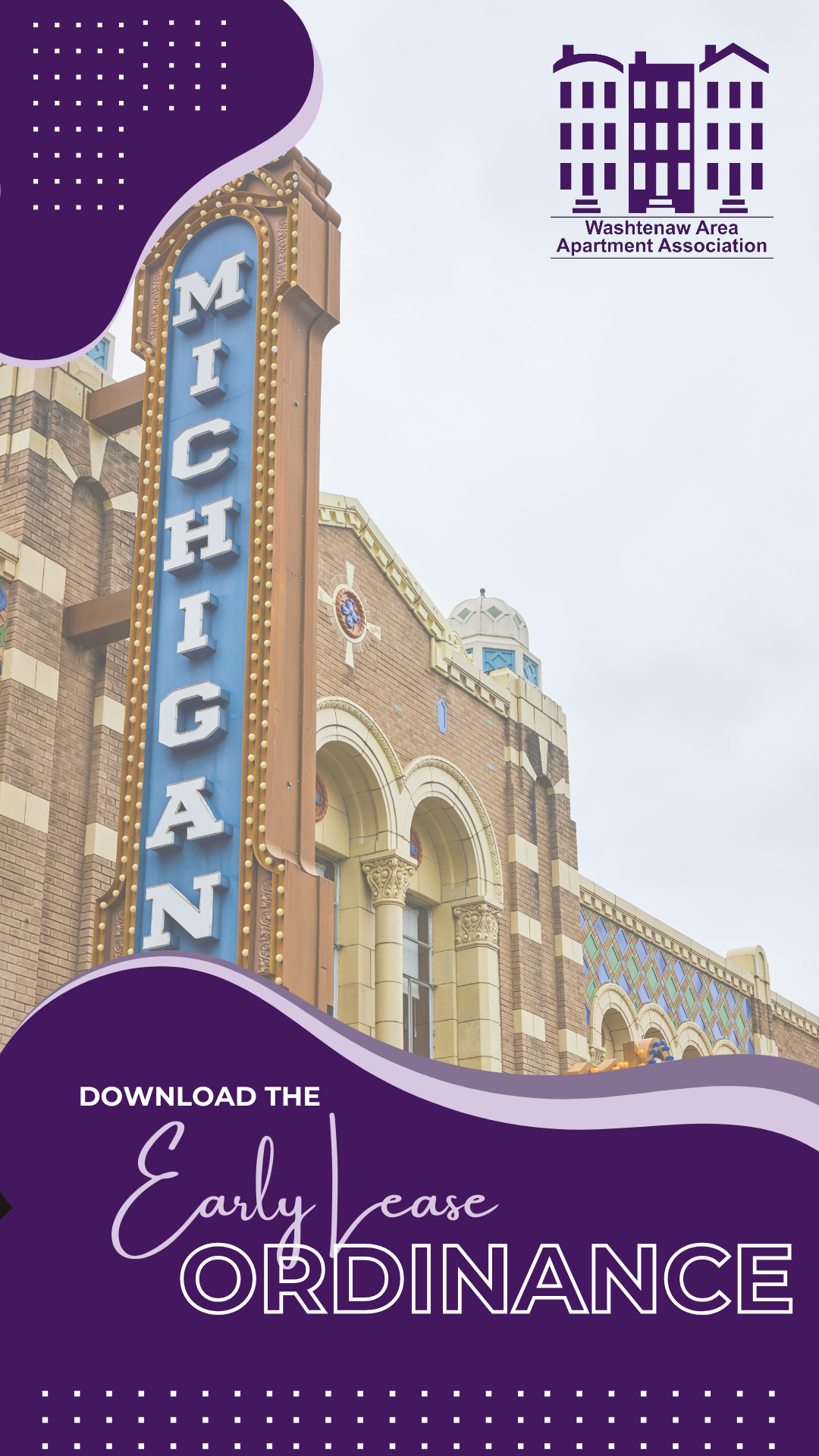Our History
The History of the Washtenaw Area Apartment Association
Since the inception of the Washtenaw Area Apartment Association in 1983, the rental housing community has pulled together, large and small, and acted with one voice to address legislation that is important to the rental apartment industry. There are now many areas of contribution the association makes such as:
- Legislation - The Association has always played a role in protecting the property rights of rental housing owners while helping ensure that the health and safety of residents are always foremost.
- Education - In the years following its foundation, the association has greatly expanded its contribution and value to the rental housing industry by expanding the education of property managers, rental leasing personnel, and maintenance staff. To support this effort awards are presented annually for leasing, management, and maintenance personnel that excel at servicing the residents of their property.
- Currently, the most recent contribution is to offer and provide an internet-based website for all member’s apartments that are available for rent, easy and convenient for renters to find by computer or cell phone. Internet Apartment Locator-
The Washtenaw Area Apartment Association started as a close-knit group of campus housing owners and managers named Ann Arbor Apartment Association. They were formed after a successful effort to defeat a city of Ann Arbor charter amendment that was a detriment to all citizens of Ann Arbor yet disguised as a benefit with a false title of “energy conservation”.
A small group of property owners and managers were forced to join together and defeat this bad legislation in the fall of 1983. Three weeks prior to the election the proposal just on the title and surface clauses would have passed 60-40. This group of owners and managers through systematic education of the voters of the inner workings of the proposal defeated it 70-30. After defeating this proposal, the group decided to form an association to provide valuable input into future legislation and rules for rental housing. One of the great learning experiences of this election was that the owners realized they needed to be in better touch with each other and assist the overall rental housing community. They then became the Ann Arbor Apartment Association in 1983.
Over the following years, numerous proposals have come before the voters and municipalities from local to statewide. Examples include forms of rent control, overreaching for excessive fees and unnecessary inspections, transfer of fees to rental owners that were not the same as homeowners, and other items important to the industry. These fees and extras were never to ensure a better housing situation for residents but to transfer city expenses to the renters. The municipal philosophy is that the transfer of costs to these owners is not significant. The other philosophy is that if the cost of rubber goes up, so does the cost of the tire. They disguise items as a fee or “tax” on the property owner but we all know who pays in the end. It is in the best interest of the owners and residents to eliminate waste and excessive costs that have no benefit to anyone.
Examples of a couple of items addressed in the past are:
- Dumpsters: The City of Ann Arbor collects property taxes and included in those amounts are the cost for trash collection for the taxpayers, homeowners, apartment owners, and commercial businesses. The city passed a resolution to eliminate the trash collection for apartment owners without any reduction in taxes to those entities. Trash is already paid for with property taxes. In this situation, the renter would pay for the trash with the property taxes and also pay a second time for private trash pick up because the city was going to eliminate the service without any reduction in taxes. Meanwhile, the homeowner receives the trash pick up and the renter does not. The renter is unfairly charged more because they only rent and don’t own their property. The association went to battle and was successful in having the apartments continue to receive the benefit of the services. The WA3 through numerous meetings, letters to the city and news, personal pleas before the city council, and much other time, was able to stop this motion from being passed.
- Certificate of Occupancy: The WA3 worked with the City of Ann Arbor Housing Department and City Council to achieve a lengthening of the re-inspection cycle for apartments in Ann Arbor from 24 months to 30 months. The 24-month cycle was extended to a 30-month cycle. It was determined and agreed to with the city that extending the cycle has no bad effect on the safety and quality of the rental housing. The value of extending is that each property is inspected in a different climate cycle providing observation at different temperature and weather conditions. For any owner, the owner, and the renter, the savings were eliminating one inspection cycle every ten years without any loss in property conditions. This extension results in one less set of inspection fees to the city every ten years. An estimate for the inspection fee alone is $550.00 per 10 units on average.
- Furnace Inspection: The proposed legislation was to have a licensed mechanical contractor inspect every furnace every 2.5 years or at every general inspection cycle. Prior to the passage of the legislation, the association through education of the municipality using heating professionals was able to adjust the cycle to every five years. The cost of Inspection is estimated at $75.00 per heating unit. This extension preserved the safety of the heating systems according to the industry's heating and furnace data while adjusting the cycle to the proper time period. This saves the cost of the fees, the costs to have the inspection, the cost of a management employee on site, and the disruption of the resident.




